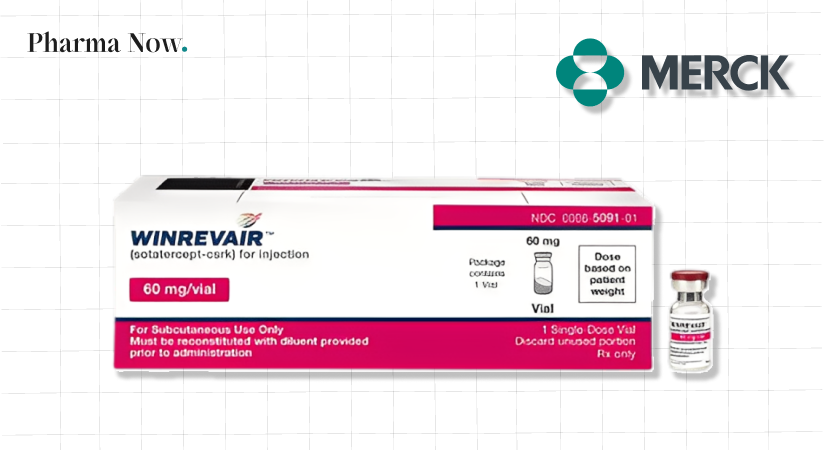WINREVAIR™ (Sotatercept-csrk) Cuts Risk Of Clinical Worsening By 76% Vs Placebo In Newly Diagnosed PAH Patients On Background Therapy In Phase 3 HYPERION Trial
Merck’s Phase 3 HYPERION trial shows WINREVAIR™ significantly reduces clinical worsening in newly diagnosed pulmonary arterial hypertension patients.
Breaking News
Oct 01, 2025
Simantini Singh Deo

Merck, known as MSD outside the United States and Canada, announced positive results from the Phase 3 HYPERION trial evaluating WINREVAIR™ (sotatercept-csrk) in adults recently diagnosed with pulmonary arterial hypertension (PAH, WHO Group 1), functional class II or III, and at intermediate or high risk of disease progression. In the study, WINREVAIR, given in combination with background therapy, reduced the risk of clinical worsening events by 76% compared to placebo plus background therapy, as measured by a composite endpoint including all-cause death, non-planned PAH-related hospitalization, atrial septostomy, lung transplantation, or PAH deterioration.
HYPERION enrolled participants within their first year of diagnosis (median seven months, as early as one month), with over 70% receiving double background therapy. In comparison, the pivotal Phase 3 STELLAR study included patients with an average disease duration of 8.8 years. The safety profile of WINREVAIR in HYPERION was consistent with prior studies. Results were presented at the 2025 European Respiratory Society Congress and published in the New England Journal of Medicine.
The trial showed an early and sustained benefit, with separation of Kaplan-Meier curves visible within six weeks. Only 10.6% of patients treated with WINREVAIR experienced at least one clinical worsening event, compared to 36.9% in the placebo group. Treatment effects were consistent across subgroups, including patients with idiopathic PAH, connective tissue disease, and those receiving double or triple background therapy, as well as patients at intermediate or intermediate-low risk according to REVEAL Lite 2 and COMPERA 2.0 risk tools.
Dr. Vallerie McLaughlin, Director of the Pulmonary Hypertension Program at the University of Michigan, noted that the trial participants reflected real-world patients, who were early in their treatment journey, older, and had comorbidities. She emphasized that initiating WINREVAIR within the first year of diagnosis significantly reduced the risk of clinical worsening events compared to placebo.
Dr. Joerg Koglin, senior vice president of general and specialty medicine at Merck Research Laboratories, highlighted that HYPERION expands the clinical evidence for WINREVAIR, reinforcing confidence in its potential to change the treatment landscape for PAH. The median follow-up was 14.6 months for WINREVAIR versus 11.5 months for placebo. Adverse events occurred in 89.4% of WINREVAIR-treated patients versus 90.0% in the placebo group, with serious adverse events reported in 24.4% and 28.1%, respectively.
WINREVAIR also demonstrated statistically significant improvements in secondary endpoints. Multicomponent improvement defined by changes in 6-minute walk distance (6MWD), NT-proBNP levels, and WHO functional class was observed in 29.4% of patients versus 14.6% on placebo. Additionally, 60.1% of WINREVAIR-treated patients achieved or maintained a low REVEAL Lite 2 score compared to 47.9% of placebo-treated patients. Improvements in other secondary endpoints, including NT-proBNP, WHO class, and 6MWD, were observed but not formally tested due to hierarchical testing rules.
The HYPERION trial was stopped early based on the totality of WINREVAIR program data, with all patients offered participation in the SOTERIA open-label extension. HYPERION is the third Phase 3 study demonstrating significant efficacy of WINREVAIR, following STELLAR and ZENITH. Results from HYPERION will be submitted to regulatory authorities worldwide. WINREVAIR is currently approved in more than 54 countries based on the STELLAR study results.
